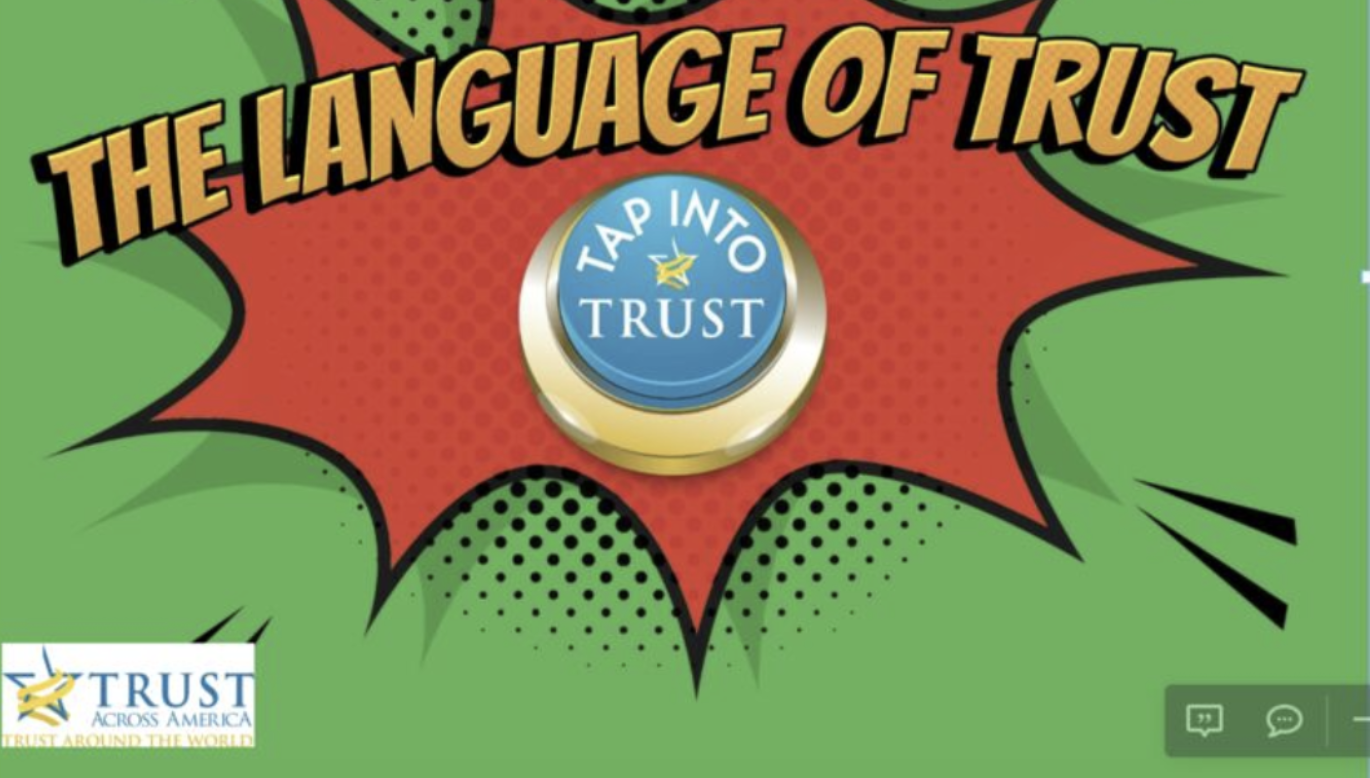By Barbara Brooks Kimmel, Founder Trust Across America-Trust Around the World
Early in 2020 several members of our Trust Alliance convened around the topic:
Trust Lessons from Working Remotely
At the time many of us had only been working remotely for several weeks, while for others, this had been their norm for years. Dozens of excellent insights were offered during the session and they are divided into three categories.
The Good
- Trust is foundational regardless of whether people are working face to face or remotely.
- Trust is the ultimate collaboration tool.
- Leaders who invested in learning the language and creating a foundation of trust have a competitive advantage in our current environment. Kudos to them for addressing trust before a crisis.
- Some employees may be more efficient working on their own schedule instead of on a time- clock, and with less micromanagement. Some interesting work-from-home data is contained in this article. www.fundera.com/resources/working-from-home-statistics
- The current pandemic environment represents a rare and unique opportunity for managers to work on trust building behaviors like accountability, openness and respect. It’s also a great time to be relying less on email and more on verbal communication.
- In all levels of society we are learning that facing challenges and solving problems are simplified when trust is amplified.
The Bad
- Adding more technology options does not build trust, nor is it a substitute for trust. Trust is interpersonal. It develops over time and builds in incremental steps through principled behavior.
- If trust was lacking in the office before the pandemic, this deficiency will be amplified with employees working remotely.
- If people are more productive working remotely, managers MUST ask themselves why.
- Employees who were disengaged pre-crisis (the majority according to Gallup) will most likely be even more disengaged now.
- Some people are finding that the 5 day work week has become a 7 day week and don’t know when to end their workday. In other words, work/life balance can suffer in some cases.
The Ugly
- Nothing busts employee trust faster than a layoff (some countries have laws prohibiting layoffs.) With so many alternatives, leaders who were the earliest to press the downsize button may be last to fill vacancies with qualified employees when they need them again. These companies will be viewed by good talent as too risky and certainly not employee centric. In fact, decline in profitability, employee performance and even bankruptcies are all too common when layoffs are the solution of choice.
- Many view fear as the opposite of trust and when leaders do nothing to allay the fears of their employees and other stakeholders during a time of crisis, they are setting themselves up for further damage in the future.
- Fluffy marketing garbage is not working. The public has become way too skeptical to believe most of the “purpose” filled trust messages that brands are attempting to deliver. When a bank tells me they are “here for me during this time of crisis” while simultaneously cutting savings account interest rates but not credit card interest, I would rather not receive their marketing message. In fact they may just lose my business.
- And speaking of banks, any organization in any industry whose leaders haven’t learned how to bank trust by building a strong foundation, can now expect their own bank balance to continue to decline as distrust increases.
A few suggestions were offered to elevate trust:
- Assign a permanent Remote Workforce Manager.
- If you didn’t already have one, a crisis continuity plan should be created.
- Have more frequent “touch points” with your team, not only about work related matters but also about personal needs. Also, don’t forget the mental health of your employees during these difficult times.
- Set up a buddy system for new employees.
- Get your workforce up to speed with technology, but don’t over invest in it, or view it as a quick and easy trust “fix.” Set aside some of that budget to learn how to build trust. It may be a little more work, but will produce much great rewards over the long-term.
Finally, Stephen M.R. Covey reminded the group that COVID is redefining our work environments. Once this crisis passes, leaders will need to reevaluate the following:
- How work is done: The “new” hybrid combining in-person and remote work will require more trust, not less.
- How we learn: Learning may require a different process that also requires more trust.
- How we lead: Leading with trust will continue to be a better way.
Now that almost three years have passed, have we made any progress? Not from my perspective. In fact, everything we knew about the benefits of high trust in the past is now further amplified. Often, it takes a crisis to remind us what happens when trust is ignored or taken for granted. Which leaders are emerging the strongest from COVID 19? Could it be those who chose to place trust in the center of their business strategy long before March 2020? Leaders and their organizations who banked trust before COVID 19 are being handsomely rewarded, and should continue to be long into the future.
Trust Alliance members including Lea Brovedani, Stephen M.R. Covey, Natalie Doyle Oldfield, Charles Feltman, Sean Flaherty, Darshan Kulkarni, Olivia Mathijsen, and Bob Whipple joined me in this very lively discussion.



This was such a deep and interesting discussion. Thanks for posting this Barbara.